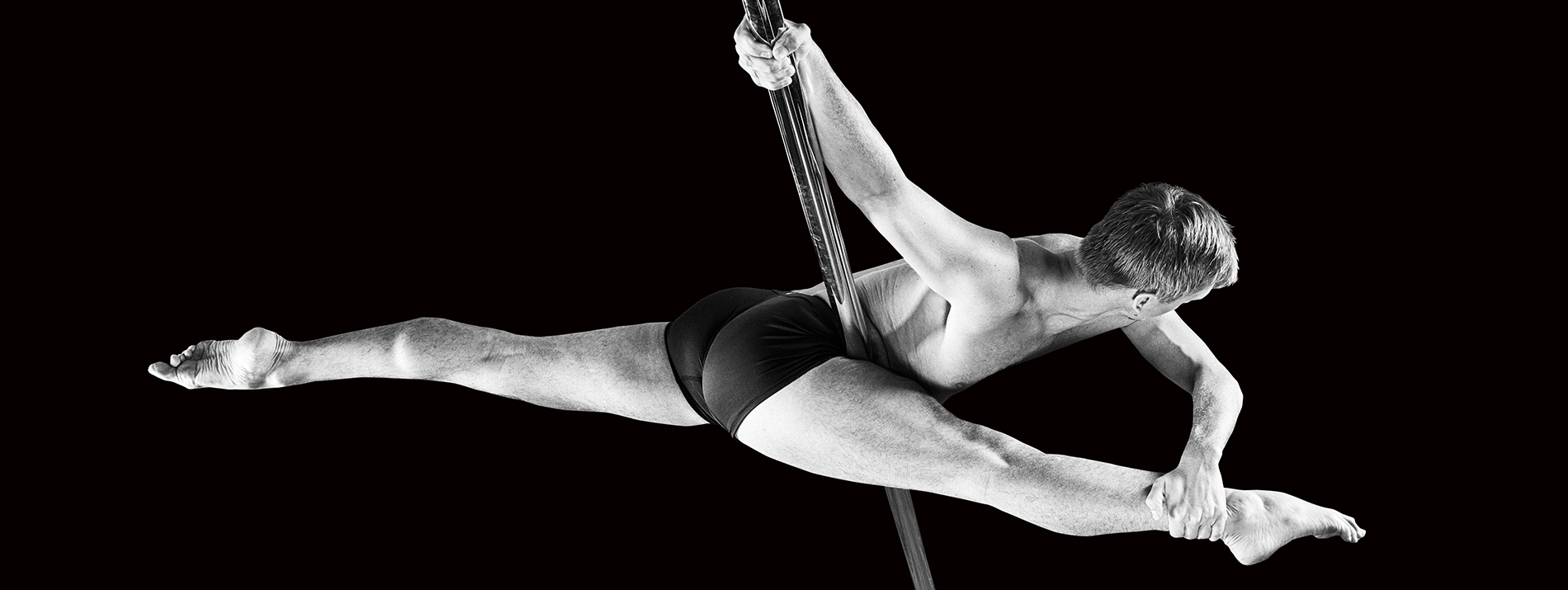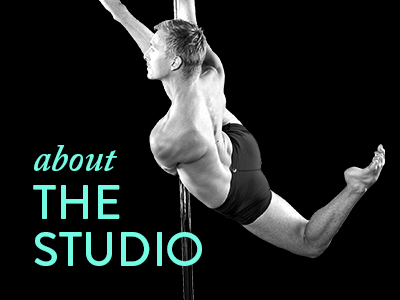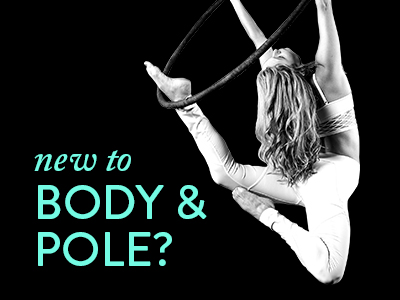Body & Pole stands with the Asian American and Pacific Islander community to stop the frightening and heartbreaking attacks of hate targeting them. Together, we must do better to protect our AAPI friends. Below, three members of the AAPI and Body & Pole communities share their personal stories and suggestions for how to support.
In addition, please join us for a special online pole Community Class fundraiser this Saturday, April 3 at 8pm EST, hosted by Veronica Chou and taught by Veronica, Nadia Sharif and Natasha Wang. We encourage you to donate a minimum of $20 to Stop AAPI Hate in lieu of payment for class. All are welcome to join:
Meeting Link: https://us02web.zoom.us/j/88689276743?pwd=Ukd1SlhsYUIrRFhsYjZ5VjI5bUVWdz09
Meeting ID: 886 8927 6743
Passcode: AAPI
Veronica Chou:

Tell us a little about your background as a pole dancer/aerialist. What got you interested in starting? What do you enjoy most about it?
In 2013, I saw a video of the Australia pole dancer, Felix Cane, and was mesmerized by her strength, flexibility, sensuality, and grace on the pole. I knew I got to try a pole dance class and be like her when I grow up. In the first year, I did not take it seriously until I realized it could be a career. So I searched online for the best pole instructors in the world and I found Body & Pole. In 2015, I moved across the world from Taiwan to New York to pursue my pole dancing dream. My family still doesn’t understand it, but pole dancing has taught me discipline and resilience which makes me a better person. When I’m pole dancing, I feel strong, confident, and free. It changed my life and I’m not exaggerating!
There has been a reported increase in anti-Asian attacks during the pandemic (Source: Stop AAPI Hate). How has your experience as a person of AAPI descent been impacted since the COVID-19 pandemic? How have you seen your community affected by this?
I’ve been called a “Chinese thing”. I’ve been asked whether we had “live chickens” in the kitchen when I was working in a restaurant. A man attempted to touch my crotch area when I was walking on the street. Fortunately, I haven’t been personally attacked in response to the pandemic, but our most vulnerable (elders and women) are certainly experiencing the brunt of it, the physical attack. Many of our elders worked so hard for their whole lives to make it in America. Some of them escaped from their countries and came to America for survival. It is heartbreaking to see them suffer.
What actions do you feel are most helpful for allies of the AAPI community to take during this time to help show their support?
There are many actions you can take as an ally:
- Send love to your AAPI friends directly and check-in on them.
- Educate yourself by talking to them and/or reading the resources.
- Amplify your voice and use your social platforms because it may be your voice that will be heard, even if it’s just a few clicks to re-share a post.
- Donate your time or money if you are able.
- If you are a leader, it is especially important for you to take action NOW because your action has influence.
- Remember that it is racism that we are fighting. No one group of people is to be blamed. Everyone is responsible.
Anything else you wish to share related to this issue?
I’d like to encourage the AAPI person who is reading this to amplify your voice as well. Stand up for your respect. Speak up loudly and proudly. Keeping our heads down will only enable racism to continue, so your action matters.
A few non-profits to support AAPI people:
https://www.theycantburnusall.org/
Justin Cai:
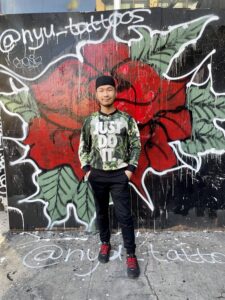
Tell us a little about your background as a pole dancer/aerialist. What got you interested in starting? What do you enjoy most about it?
I first discovered pole dancing when I accidentally came across a YouTube video of Evgeny Greshilov pole dancing to my favorite song, “Slow Dancing in a Burning Room”. I was mesmerized by how he showcased power and grace in perfect harmony. With the help of Google, I quickly found Body & Pole. Over the past 3 years, I became an active member of the pole and aerial community. With the supoort of my mentors and friends, I performed at NYC Summer Streets in 2019, Let Them Eat Cake, and several Body & Pole showcases.
Pole dancing creates a platform for me to express myself and stay in tune with sides of me that I didn’t know existed. I enjoy the process of learning to harness grace and composure in each intricate movement. In addition, Body & Pole provides me with a sense of community to live a lifestyle filled with passion and endless possibilities.
There has been a reported increase in anti-Asian attacks during the pandemic (Source: Stop AAPI Hate). How has your experience as a person of AAPI descent been impacted since the COVID-19 pandemic? How have you seen your community affected by this?
I have been verbally harassed multiple times when I was in the subway station. Like most people in New York, I rely heavily on the public transportation system. There have been a few situations when elderly customers on the train refused to let me sit on a seat close to them. One time, an elderly woman called me a “Chinese virus” as she walked quickly away from me. I understand that it is human nature to avoid those who are stigmatized. However, it still hurt when I was ostracized by strangers in public. My experience is a direct reflection upon the drastic surge of hate crimes against Asian Americans since the beginning of the Covid-19 outbreak. AAPI women were twice as likely to be the victims of discrimination, compared to men. I still remember how shocked I was when a close female Asian friend of mine told me that she was kicked in the back by a homeless man when she was walking into the subway station. Following female AAPI individuals, the older AAPI population are also frequent victims of anti-Asian hate crimes. AAPI-run businesses, like restaurants, were the primary sites for events of discrimination and vandalism. Outrage and profound sorrow is widespread among the AAPI community in the wake of the attacks against AAPI individuals. Many AAPI people no longer feel safe walking around the city, just because of how they look.
What actions do you feel are most helpful for allies of the AAPI community to take during this time to help show their support?
One may support by paying patronage to local Asian-owned businesses (i.e. ordering take-outs from local Chinese restaurants). Additionally, organizations may donate to platforms dedicated to combating hate and racism against AAPI individuals, such as the Stop Asian Hate GoFundMe page and other organizations to donate to.
Anything else you wish to share related to this issue?
It is important to note that the hate crimes reported by Stop AAPI Hate could be vastly underreported due to the potential cultural differences and language barriers experienced by AAPI individuals in the U.S. In addition to donations, it is important for people to learn more about the AAPI experience and to start calling out events of anti-Asian discrimination. This article offers simple gestures one may take to make a positive impact on the Stop Asian hate movement in their life. This article provides resources that will educate viewers about racism against AAPI individuals.
Caitlin Goddard:
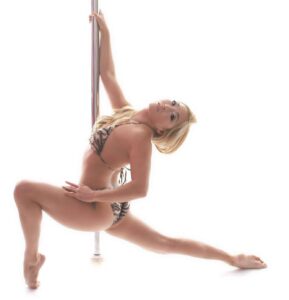
Tell us a little about your background as a pole dancer/aerialist. What got you interested in starting? What do you enjoy most about it?
I started pole dancing almost 15 years ago. I signed up for a class at S Factor because some of the girls I knew where I was teaching Pilates had started taking lessons there. In the free intro class, the instructor did the upside down caterpillar crawl and it totally blew my mind. New York Pole Dancing was expanding at that point and I took their teacher training course and started teaching pretty immediately even though I was not much more advanced than my beginner students. It was the old OG days where we didn’t know how to spot and we taught ourselves to handspring from watching Karol Helms’ YouTube. What I have loved about pole and aerial dance is the opportunity the art forms have given me to create and express using my body as a vehicle. I was never successful in traditional dance forms, but particularly since learning to freestyle and flow, I learned my body speaks a language that is only my own, and no matter what tricks I can or cannot do, dance is a necessary form of communication for me.
There has been a reported increase in anti-Asian attacks during the pandemic (Source: Stop AAPI Hate). How has your experience as a person of AAPI descent been impacted since the COVID-19 pandemic? How have you seen your community affected by this?
As an Asian American cisgender woman, my lived experience of anti-Asian sentiment has been primarily bearing the psychological and emotional weight of it all with few opportunities to speak as a minority viewpoint. Asian women of all socioeconomic conditions exist at the crosshairs of racism and misogyny – our lives only so valuable as the fetishism and fantasy of mostly white American men make us. More frequently, as in the Atlanta murders, it means that being sexualized as an Asian woman is not actually empowering. It means we are invisible except that we are sexually desirable, and because we are a threat or a danger in that way, violence against us is acceptable.
Usually my socioeconomic and other privileges (e.g. I am not transgender or an immigrant or an elderly person) shield me from most forms of anti-Asian hate, but the Covid-19 pandemic is the first time in my adult life in New York I actually am afraid at certain times and places because of my Asian face.
Fear, anger, and the generational pain of living with racism as a mostly discounted “invisible minority” are all psychologically significant burdens. People who live with the privilege of being white (and / or heterosexual and / or cisgender and / or male) frequently discount the suffering of Asian American women. The thinking is – you’re fine, people think you’re sexy and you’re good at math, what do you have to complain about?
What actions do you feel are most helpful for allies of the AAPI community to take during this time to help show their support?
To me, any and all actions – even performative allyship – are a great starting point. When we have been discounted as a valid minority viewpoint for so long, I for one will take your Instagram hashtag. We have to say out loud we know Asian Americans have been targeted for violent acts particularly since Covid-19 and it needs to stop. If you can, donate to a charity in support of AAPI communities. Check on your AAPI friends and colleagues and ask them if they are ok.
Anything else you wish to share related to this issue?
I am really proud to be a part of the pole community because it is the one place in my life where I do see my former colleagues (and so many beloved lifelong friends) taking a stance on difficult issues regarding race, even when none of us are sure if we’re being a truly good ally. Sure, we make mistakes when learning to be anti-racist because racism and sexism are so ingrained in American culture, and we get confused into sometimes accidentally giving power to the systems we wish to dismantle. But because pole dancers tend to be humans who (hopefully) support sex workers, let us always be the people who aim to empower women, POC, LGBTQ community members, the poor, and the underrepresented. And let us use our art and the platform our art gives us to keep moving forward, even if we make mistakes.
Through pole dance, I have been hired for the only job ever in my life I got because I am Asian (dancing for a corporate Chinese New Year gig). I have also been hired for open casting calls where I know being Asian wasn’t what they were originally looking for. I have danced alongside all races and genders and across socioeconomic strata, sometimes granting me the opportunity to talk and listen about these things, and sometimes just because we all love to dance.
Please join our Community Class fundraiser this Saturday, April 3 at 8pm EST.
Meeting Link: https://us02web.zoom.us/j/88689276743?pwd=Ukd1SlhsYUIrRFhsYjZ5VjI5bUVWdz09
Meeting ID: 886 8927 6743
Passcode: AAPI
Suggested $20 donation to Stop AAPI Hate in lieu of payment for class.

